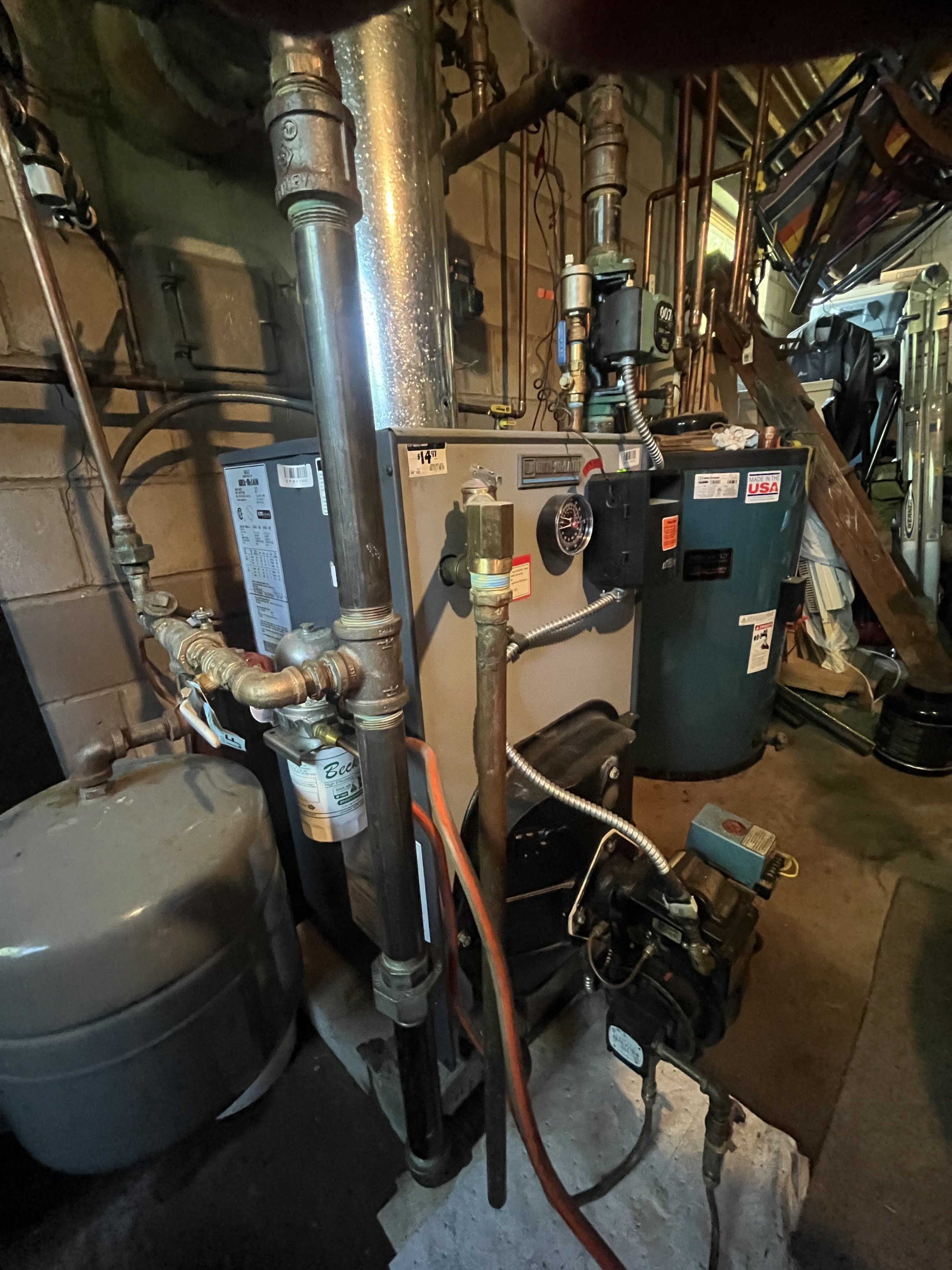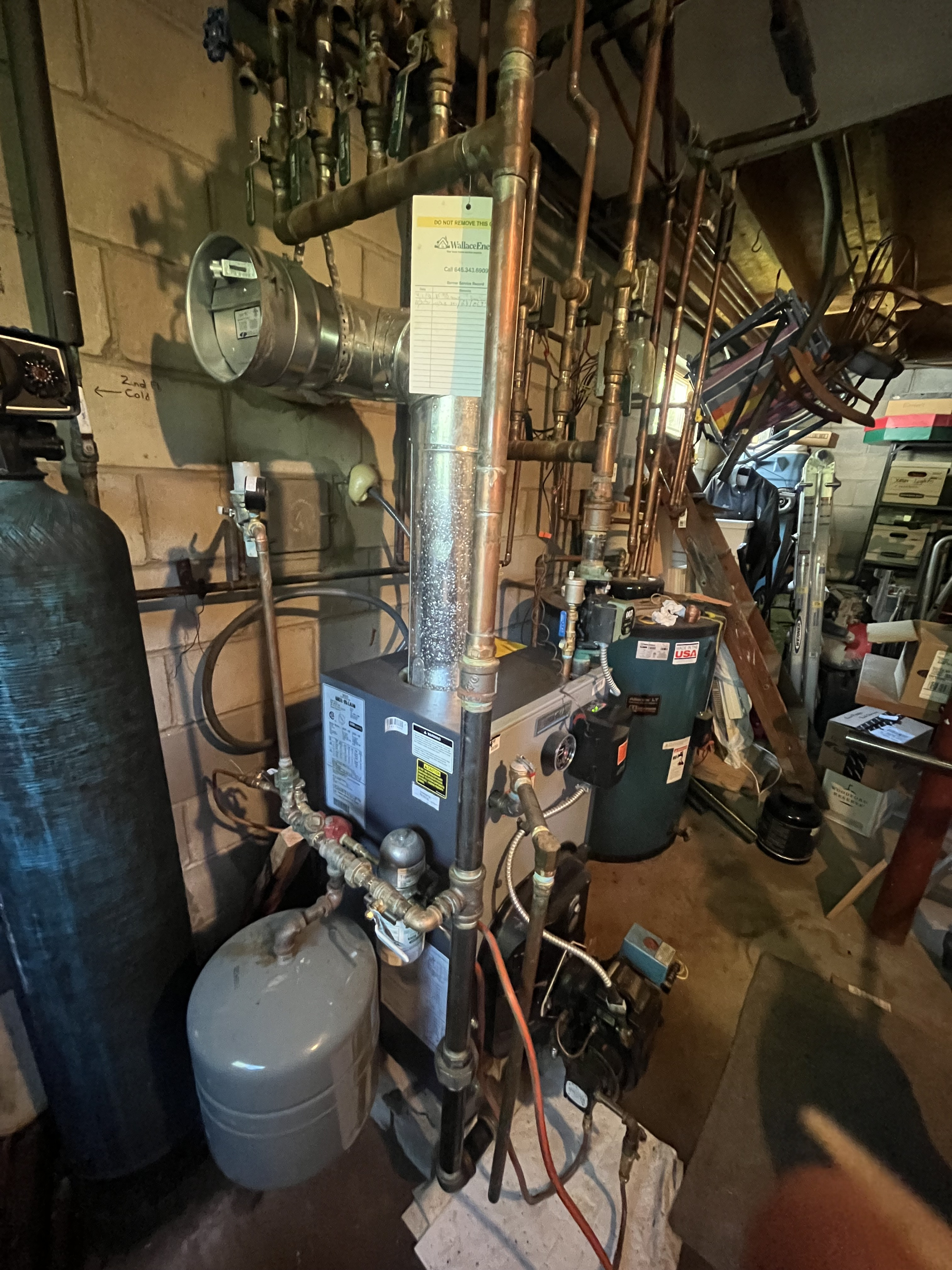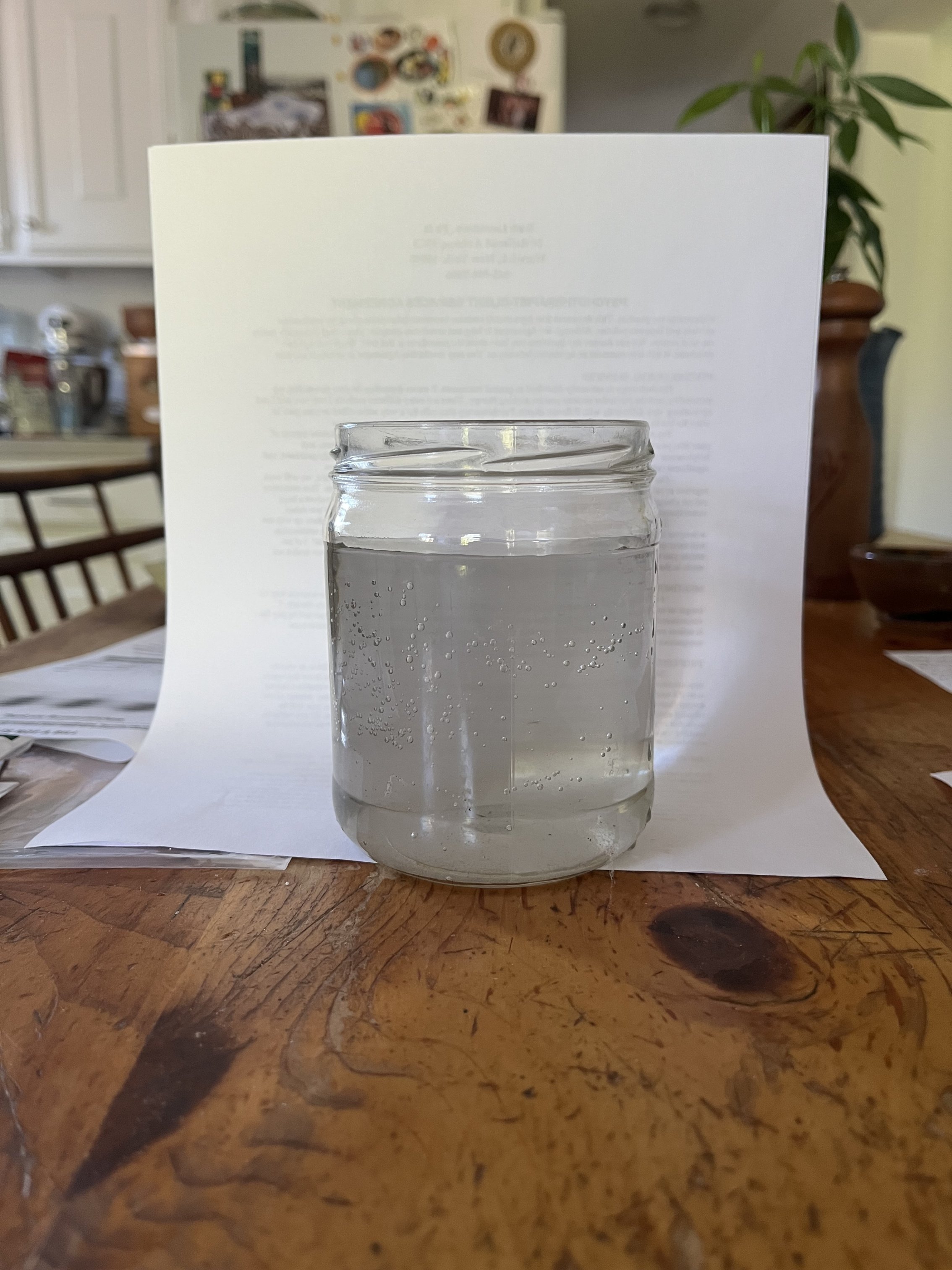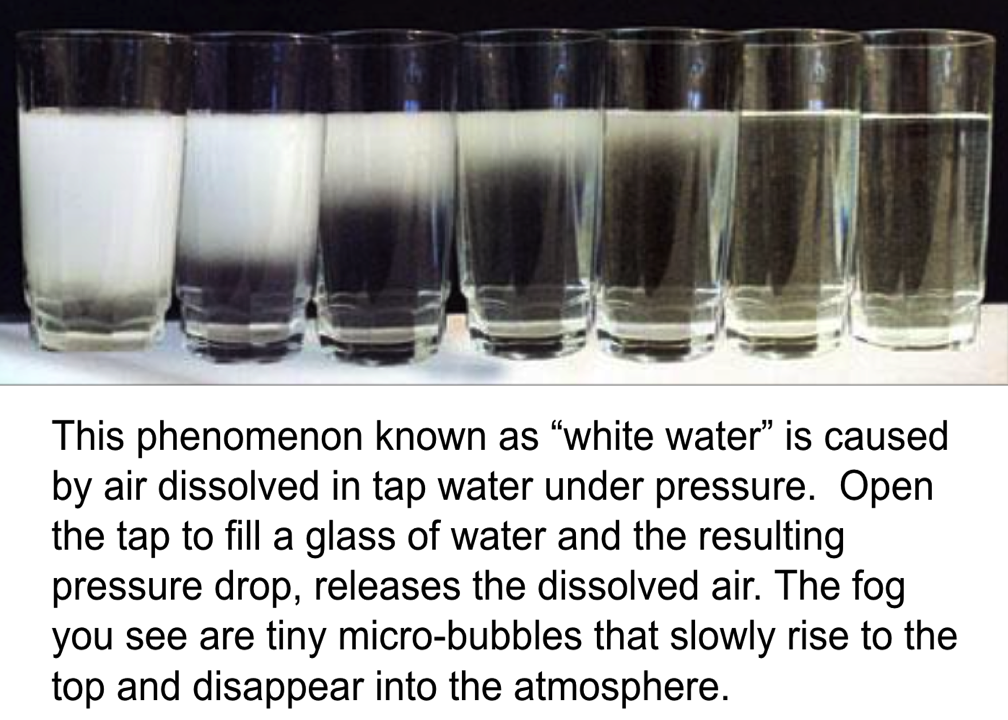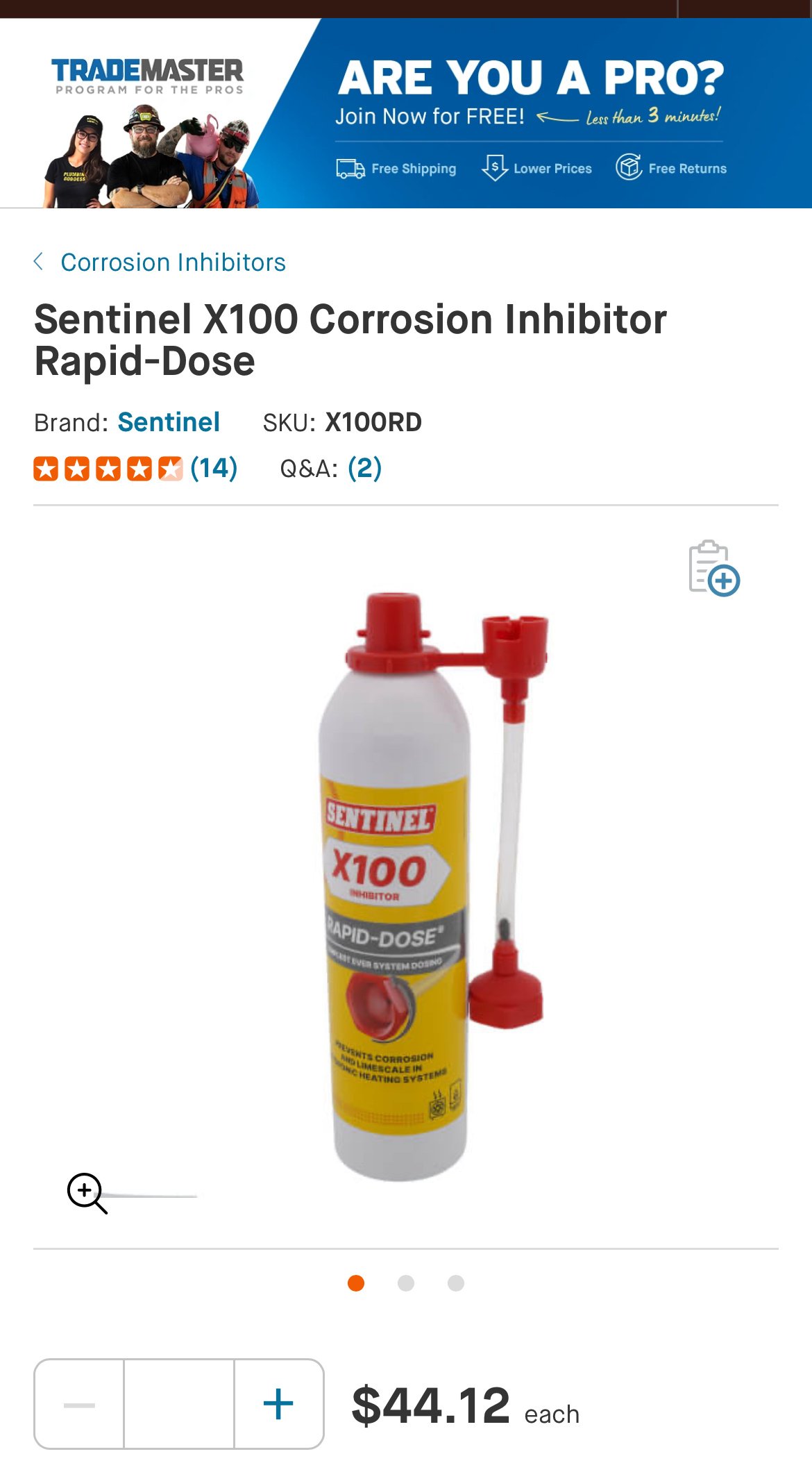One-inch magnetic filter on 1-1/4 boiler return?
Thinking of installing a magnetic filter like the Caleffi Dirtmag or Webstone filter etc. on hydronic oil system. I need the vertical kind and they only go up to 1", but my return is 1/1/4". Can I still reduce to 1" for the filter and then go back to 1-1/4"? Is such a reduction in the middle of the return "legal?"
Also, I figure the best place for the thing is between the fresh water supply and the boiler (see photos) because then any fresh water would go right through the filter (my water has lots of minerals in it). However, it might be a lot easier for me to put it on the copper section of the return up top (going to manifold, also 1-1/4") because I wouldn’t have to worry about exact lengths of threaded pipe, but then fresh water with all its minerals would go through the system before hitting the filter; still, would it make that much of a difference?
So:
- Okay to reduce/unreduce?
- Where would you put it?
FWIW I plan to use Sentinel cleaner and then Sentinel inhibitor in the system to clean and prevent corrosion.
Comments
-
what is the output of the boiler? You can reduce it if you can move the outptu of the boiler through 1". You have more than enough room to plumb in a loop to install the horizontal version.
0 -
@mattmia2 so far I don't see the Weil-Mclain specs saying anything about the gallons of water output of the boiler, but I'll keep looking. But my Taco 007e circulator is rated to go up to 16 gpm, and AI says a 1" pipe is not sufficient for 16 gpm. No idea whether it ever really goes up to that.
I never stretched my brain to the idea of a loop, but it is now stretching.
0 -
A brief restriction like that filter isn't going to be a problem. And it is MUCH better to have it in the heating loop.
Br. Jamie, osb
Building superintendent/caretaker, 7200 sq. ft. historic house museum with dependencies in New England0 -
Heat output in btu/hr. From that you can figure out what the flow needs to be to move that much heat.
0 -
1" will do 8gpm or an 80,000 btu boiler
0 -
Why install the filter? I dont think you gain a whole lot in your set up.
0 -
@EBEBRATT-Ed it's 115,000 btu, so I'm thinking I shouldn't put the 1" in. However, @Jamie Hall does say the brief restriction won't matter.
And @kcopp wonders whether I need the Dirtmag in the first place — and I wonder that too! In another thread
@EdTheHeaterMan questions whether I need the magnetic filter/Dirtmag at all, and also whether I need the microbubble air separator I was looking at (both of which would be a hassle to install if you take the time and ease of installation for you pros and multiply by a DIY factor of 1200).
This might be a subject for a new future thread: the need for air separators and magnetic filters on residential hydronic cast iron boiler setups like mine. I simply do not know, and will research it more. I did think that since I have very high TDS (total dissolved solids) with undoubtedly a lot of metals and minerals, this thing might help. (I don't have the lab report anymore, so don't know the breakdown of what's in there metalwise.)
I do plan to clean with Sentinel X400 cleaner and later put in X100 inhibitor, maybe that's enough?
0 -
the mag seps are mist critical on system with ECM circulators, as they keep the tiny magnetite particles from getting into the pump
Cast boiler with 007, probably not a priority
A micro bubble air purger, for sureBob "hot rod" Rohr
trainer for Caleffi NA
Living the hydronic dream0 -
11 gpm to move 110,000 btu/hr is 4.5 fps through the 1" section, it is a little higher than what you'd design for but it will be fine for that little section of pipe.
0 -
I like the microbubble air separators in most cases. The problem in this case is where to put it. As the system is already piped with the circulator on the supply side of the system and the built in air scoop that is part of the Weil McLain boiler has the air vent a little higher than the 1-1/4" supply exit pipe on the boiler, I don't see that there will be that much benefit. I would ask these questions: "How many air problems showed up this winter after you moved the circulator to the supply side? How many air problems showed up after you installed that air vent in the 1/2" vent tapping? What problems are you trying to solve since you did the repipe last autumn? If there are no existing air problems, and the repipe you did last autumn solved the previous air problems, STOP trying to fix a problem you don't have.
Did you look at the water that comes out of the boiler drain at the bottom of the boiler? is it a little grey? that is not a problem that needs fixing. Actually that grey colored water is something good and you want to keep that water in the boiler. IOf you are getting thick mud out of the boiler drain, then you have a leak that needs to be fixed because that leak is causing new fresh water with all that oxygen and minerals that are causing that much mud to accumulate over one heating season.
Open the boiler drain and let about 1 cup of water out into a container then look at the color of it (use a clear plastic or glass container to look thru the water). Take a picture of it and show everyone here the water that you removed from the boiler after 1 year of operation actually looks like. I want to see all that mud you are trying to remove with the DirtMag. I bet there is no mud. OR After you install the DirtMag… next year you can look at the accumulation in that filter and let us know if it was actually necessary.
Edward Young Retired
After you make that expensive repair and you still have the same problem, What will you check next?
0 -
Just so you know @seized123 there are some folks that have their boiler installed incorrectly with the pump on the return and the expansion tank on the supply, the auto water feed on the suction side of the pump and all other types of stuff that you haver already corrected. Those system can work for years and years without ever having to replace a circulator pump or move an expansion tank. It seems that you like to read about what is the best practice and do that to your system, even if you don't get any benefit from it. Your constant draining and adding water to make another minor correction every year until you have the best design ever, might actually cause more problems that you are correcting.
When I do a maintenance on a boiler that is poorly designed, I don't recommend to my customer that we make a minor change here and another minor change in the design next year, and continue to redesign everything with every new article I read in the trade journals. Those 80 year old systems worked fine for 80 years. Those 50 year old systems worked fine for years and those 20 year old systems worked fine for years. I might add that until you actually experience a problem with your system, just do the maintenance and leave the system just work as it is. You already did all you need to do last year. Let it work for a couple of years before you start changing stuff around. You may find that nothing fails to operate and there is no need for change.
If I have a problem with constantly draining an expansion tank two times a year, or constant air problem with one loop of baseboard in a home, then I would recommend a major redesign to solve a problem. But if the system is operating satisfactory, then I go with the old saying… "IF IT AIN'T BROKE…" you know the rest.
Edward Young Retired
After you make that expensive repair and you still have the same problem, What will you check next?
2 -
Because that cast iron boiler is very low flow resistance systems with that type of boiler usually are pretty tolerant of incorrect layout of the circulator, feed, and expansion tank. I think if you order one with a circulator included the manufacturer still ships it with the circulator on the return.
0 -
The type of circ has some to do with PONPC also. 50 years ago most circs were low head versions like a B&G series 100.
As wet rotor style circs became more available they were a higher rpm higher head and could start air or noise problems that did not exist with the 1725 rpm 3 piece circs.
So pumping away got more attention and usefulness. In addition to the release of the blockbuster Pumping Away book.
With any low pressure drop boiler the exp could be on a return, with pump and purger on supply, like this.
If your boiler is a 110,000 input at 85% efficiency 8-9 gpm would be plenty of flow. 1" piping and components would be fine. If you ever need full boiler output?
The Caleffi 1" 5453 vertical DirtMag has a 9 Cv.
Bob "hot rod" Rohr
trainer for Caleffi NA
Living the hydronic dream0 -
Lots of great stuff to reply to here, and I will later. But first, as per @EdTheHeaterMan’s suggestion, for the very first time to the general public, a photo of the thick black sludge that was only in my mind, not the boiler, after a year of operation. This is with the small leak on the supply.
(Given this nice gray water, would it still be worth it to treat the system with cleaner then inhibitor like Sentinel’s X400 and X100 or another brand? The system will be open soon to repair that leak, however if that repair is all I do I’d just have to drain enough to get below the supply tapping — zones closed — which is a lot different than draining the whole system and refilling with all that fresh oxygen. Another possibility is just to use the inhibitor, in theory Sentinel’s can be injected with little or no draining.)
1 -
You need to worry about all your cast iron radiators with all that black sludge build up from the iron pipes when you replace the boiler with an aluminum block or stainless steel mod/con boiler.
Oh but wait… You don't have any cast iron radiators, and all your pipes are copper, and your sludge filled cast iron boiler doesn't have any sludge. I might not see that spending any money on chemicals to fix a problem you don't have will benefit you today. IMHO from a boiler installer for over 40 years.
But I do see that there is some air that was dissolved in the water under 12 to 18 PSI pressure. now that the water is at a lower pressure, that air has formed some micro bubbles that have merged with other micro bubbles to form actual bubbles you can see.
Here is a slide from my powerpoint presentation that explains how a drop in pressure will release air from being dissolved in the water. The series of photos of the same glass appear in succession, represents the same glass photographed over a few seconds of time showing the cloud of micro-bubbles getting released from the lower pressure water and then vanishing into the atmosphere as air.
Edward Young Retired
After you make that expensive repair and you still have the same problem, What will you check next?
0 -
-
you could also just throw the ditrtmag on one of the zones and let it pick up stuff as it passes through that zone, you aren't getting a ton of stiff in the water, it doesn't all have to pas through the filter all the time. maybe use the dhw zone since it will run in the summer, but you don't really need it, might make the circulator last a bit longer or forever.
0 -
absolutely no harm in 50 bucks worth of inhibitor after piping changes
Included is a ph buffer, oxygen scavenger, film provide, lubricant for the components
Bob "hot rod" Rohr
trainer for Caleffi NA
Living the hydronic dream0
Categories
- All Categories
- 87.5K THE MAIN WALL
- 3.3K A-C, Heat Pumps & Refrigeration
- 61 Biomass
- 430 Carbon Monoxide Awareness
- 123 Chimneys & Flues
- 2.1K Domestic Hot Water
- 5.9K Gas Heating
- 118 Geothermal
- 170 Indoor-Air Quality
- 3.8K Oil Heating
- 78 Pipe Deterioration
- 1K Plumbing
- 6.6K Radiant Heating
- 395 Solar
- 15.9K Strictly Steam
- 3.5K Thermostats and Controls
- 57 Water Quality
- 51 Industry Classes
- 51 Job Opportunities
- 18 Recall Announcements
